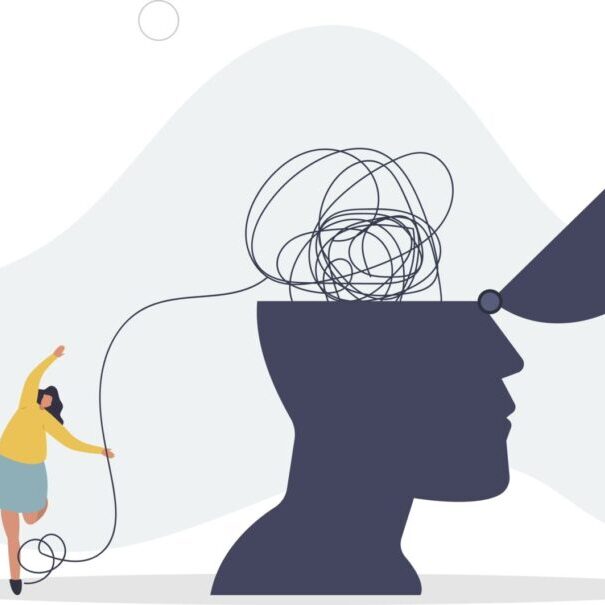The Role of Self-Compassion in Reducing Anxiety and Improving Self-Esteem

As rates of anxiety reach unprecedented highs, many people seek effective strategies to reduce anxiety and improve self-esteem. Self-compassion is a powerful tool in this regard, offering a pathway to manage anxiety and enhance overall mental well-being.
By integrating self-compassion into your daily life, you can foster a more positive self-view and mitigate the impact of anxiety. This blog will explore how self-compassion can be a crucial element in reducing anxiety and improving self-esteem, and the ways in which Internal Family Systems (IFS) Therapy can support this Process.
Anxiety in Chicago
Living in a big city like Chicago can amplify anxiety for many people. The fast pace, constant noise, crowded spaces, and the hustle to keep up with the demands of work, commuting, and social life can be overwhelming.
For some, the pressure to succeed or stay afloat financially adds to the strain, while navigating political and racial divides can be a daily source of stress. With so much external chaos, it’s easy to lose sight of self-compassion.
In fact, being kind to yourself might feel more difficult in Chicago. As a Chicago therapist, my experience is that Chicagoans may internalize the idea that they should always be doing more or handling stress better, making it harder to slow down, acknowledge their feelings, and treat themselves with kindness. This constant drive can lead to a cycle of self-criticism, leaving little room for the gentleness and understanding that self-compassion requires.
How Self-Compassion Helps to Reduce Anxiety
To effectively manage anxiety, it’s essential to address not only the symptoms but also the underlying emotional responses. Self-compassion plays a critical role in this by shifting how we interact with ourselves during challenging times.
Self-compassion involves treating yourself with kindness, understanding, and patience during moments of struggle. When anxiety strikes, it often brings a barrage of self-criticism and negative self-talk. Instead of amplifying these feelings, self-compassion encourages a more nurturing response.
For instance, rather than berating yourself for feeling anxious, self-compassion allows you to acknowledge the anxiety with empathy and understanding. This shift in perspective can significantly help to reduce anxiety by fostering a supportive inner dialogue.
Practical Ways You Can Incorporate Self-Compassion
Integrating self-compassion into your life doesn’t require a complete overhaul. Simple practices can make a substantial difference.
- Start by acknowledging your feelings of anxiety without judgment.
- Use affirmations and kind self-talk to counteract negative thoughts. For example, if you notice the thought, “I’m failing at handling this anxiety,” try replacing it with, “It’s okay to feel anxious, and I’m doing my best to manage it.”
- Engaging in mindfulness exercises can also be beneficial, as they encourage you to observe your thoughts and emotions without reacting harshly.
- Consider individual therapy, such as CBT or IFS therapy.
Building Self-Esteem Through Self-Compassion
Self-esteem is significantly influenced by how we perceive and treat ourselves. The good news is that self-compassion can transform how we view ourselves, leading to improved self-esteem and a healthier self-image.
When you practice self-compassion, you start to develop a kinder and more supportive relationship with yourself. This positive internal dialogue helps to counteract feelings of inadequacy and self-doubt.
By regularly practicing self-compassion, you can build a more resilient sense of self-esteem. For instance, when faced with a setback, self-compassion encourages you to see it as a learning opportunity rather than a reflection of your worth. This change in perspective can enhance your confidence and self-esteem.
Sam’s Story
Consider Sam’s Story, a 34-year-old marketing professional living in Chicago. For years, Sam struggled with low self-esteem. She was her own worst critic, constantly feeling like she wasn’t good enough, especially in the high-pressure environment of her job.
Whenever she made a mistake, she would ruminate on it for days, thinking it was proof she didn’t measure up. This self-criticism spilled into other areas of her life, from her friendships to her appearance.
One day, after a particularly rough week at work, Sam decided to try something different. She’d been reading about self-compassion and how it could help break the cycle of harsh self-judgment. At first, it felt awkward, but she began to practice small acts of kindness toward herself.
Instead of berating herself for missing a deadline, she acknowledged how stressed she had been and reminded herself that everyone makes mistakes. When she felt overwhelmed by her workload, she gave herself permission to take breaks without guilt, understanding that rest was important for her well-being.
Over time, these small changes made a big difference. Sam noticed that her inner dialogue was softer and more forgiving. Instead of tearing herself down, she learned to accept her imperfections and focus on her efforts, not just her outcomes.
This shift in mindset led to a boost in her self-esteem. She no longer felt defined by her mistakes but by how she treated herself during challenging times. Practicing self-compassion allowed Sam to build a healthier, more balanced relationship with herself, ultimately improving her confidence both at work and in her personal life.
Unfortunately, not all stories are like Sam’s – that’s where individual therapy comes in!
Using Internal Family Systems Therapy to Enhance Self-Compassion
Internal Family Systems (IFS) Therapy is an effective approach to fostering self-compassion and improving self-esteem. IFS Therapy helps people understand and work with the different parts of themselves that contribute to their overall psychological experience.
As the IFS book, No Bad Parts, is so aptly titled, IFS presumes that all parts of us are trying to serve us in some way. Some parts may be looking to prevent bad things from happening and others may be looking to step in and take care of us when we feel overwhelmed; but in IFS, all parts are afforded compassion.
How IFS Therapy Supports Self-Compassion
IFS Therapy can be particularly beneficial for enhancing self-compassion. It allows people to connect with their core self, which naturally and inherently embodies compassion and understanding. By engaging with and healing the internal parts that hold negative self-beliefs or self-criticism, IFS Therapy helps people cultivate a more compassionate inner voice.
For example, if you have a part of yourself that is highly self-critical, IFS Therapy can help you become curious about the function of that part, address its needs and concerns, and transform this critical part, allowing your core self to lead with compassion.
During IFS Therapy, therapists use techniques that promote self-compassion. These can include visualizations, attention to physical sensations in the body, compassionate self-talk, and exercises to build empathy for oneself. By working with these techniques, people can develop a more supportive and understanding relationship with themselves, further reducing anxiety and improving self-esteem.
The Synergy Between Self-Compassion and Anxiety Therapy
More traditional forms of therapy, such as Cognitive Behavioral Therapy (CBT), can also build self-compassion.
CBT is a widely used method for managing anxiety. Combining CBT with self-compassion practices can improve outcomes. For example, CBT techniques for challenging negative thoughts can be complemented with self-compassionate self-talk. This approach not only helps in changing maladaptive thought patterns but also in nurturing a more supportive and compassionate self-view.
The Role of Self-Compassion in Long-Term Anxiety Management
Regardless of the approach to anxiety therapy, self-compassion is a valuable component of long-term anxiety management as well. It helps people build resilience and maintain a positive outlook, even in the face of ongoing challenges. By consistently practicing self-compassion, you create a foundation of emotional support that can help you manage anxiety more effectively over time.
Start Leveraging Self-Compassion Today!
At Tandem Psychology, we believe that healing begins with self-compassion. If you’re struggling with anxiety or low self-esteem and are finding it difficult to be kind to yourself, therapy can provide the guidance you need.
Our therapists specialize in approaches like Internal Family Systems (IFS) and Cognitive Behavioral Therapy (CBT) to help you foster self-compassion, reduce anxiety, and build a more resilient sense of self.
Whether you’re navigating the unique stresses of living in Chicago or simply want to improve your mental health, we’re here to support you. Contact Tandem Psychology today to start your journey toward a more compassionate and fulfilling life.
This blog is made for informational and educational purposes only. It is not medical advice. The information in this blog is not intended to (1) replace a one-on-one relationship with a qualified licensed health care provider, (2) create or establish a provider-patient relationship, or (3) create a duty for us to follow up with you.



